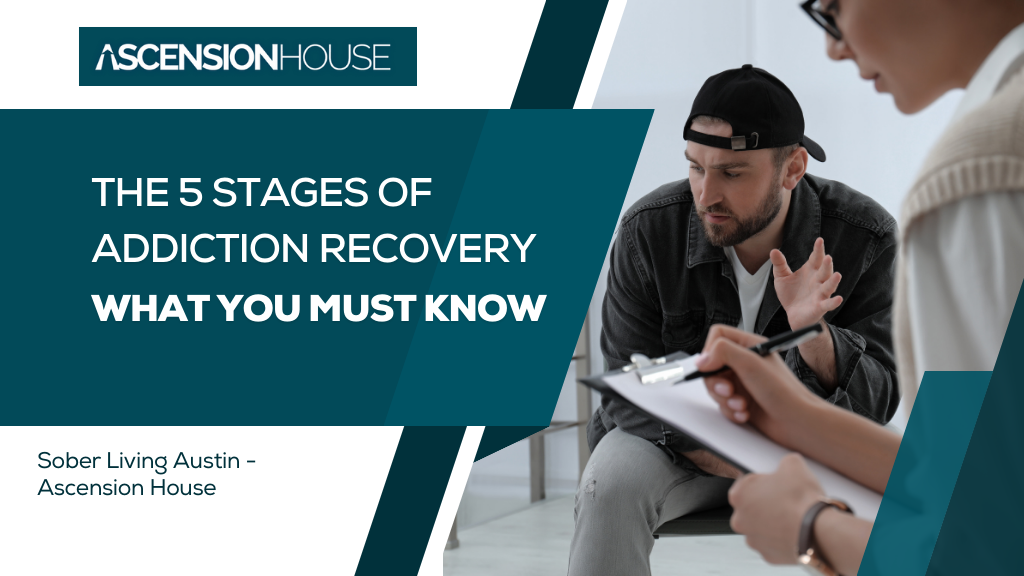
Everyone is unique, so each person experiences drug abuse and addiction differently. No two people share the same road to development or recovery because they occur based on various factors.
Elements that might influence your addiction and recovery include:
- Type of drug
- Prior drug use
- Family history
- Duration of the addiction
- Age
Everyone experiences the five stages of addiction recovery differently, but they are all similar in progression. Though there are up to 10 stages for addiction development, there are only five for recovery. If you are dealing with drug abuse, it’s wise to seek addiction treatment, such as group therapy sessions, allowing you to begin recovery soon.
The Five Stages for the Substance Abuse Recovery Process
There are only five stages of addiction recovery, and it’s a process. Therefore, you need encouragement and support to get over the drug abuse. Recovering individuals may feel that it’s impossible to quit, but seeking professional help for substance use disorders is crucial and possible!
Navigate the transformative stages of addiction recovery – a vital guide to understanding and embracing your journey to freedom.
— Ascension House – Sober Living Austin (@AscensionSober) August 8, 2023
Blog here: https://t.co/jW3OWk2L14 pic.twitter.com/x5MiHpUiXX
1. Awareness
Addicts start the recovery process by being aware of their addictive behaviors and realizing that substance abuse is a problem. They have to want to do something. Sometimes, the step is called acknowledgment or recognition. Regardless, the addict themselves (not family members and friends) must admit there’s a problem to solve.
Often, this happens during a crisis event. The impactful moment will force the addict to face facts and realize they have a substance use disorder that’s now dangerous.
Typically, the event is dangerous to everyone involved, such as a car crash while drunk driving, but it could be emotional anxiety (a partner leaves the relationship). Regardless, it’s the wake-up call the person needs to realize they have an addiction and seek substance abuse treatment.
2. Consideration
Often called the contemplation stage, the addict finally realizes they have a drug or alcohol addiction. They reflect on their lives and want to learn more about drug addiction. This will help them understand what happened, the strength of the substance bond, and what to do about it.
Typically, the user understands more than before and wants to focus on the damage they caused to their life and everyone around them. Usually, the individual isn’t making direct efforts, such as going through a rehab program, but they gain focus on the power addiction has on them.
3. Exploring Recovery
Once the addict has learned about their addiction and acknowledged the problem, they can find rehab programs and treatment options to help them. This happens by speaking to family and friends and researching online.
Recovery will move from a desire to fix things to actively going to being drug-free. Most addicts choose treatment facilities, and some call it the action stage. Regardless, they’re focused on stopping addictive behavior.
Other people call this stage the preparation stage because they start setting goals and creating an action plan to stop the addiction. This will strengthen the objective in their minds and shouldn’t be rushed.
4. Early Recovery
In the early stages of recovery, the addict probably hasn’t gone to the rehab center yet. However, they will at this point. They’ve created the addiction treatment plan and want to implement it and see things through.
With so many options available, it’s essential to use therapeutic interventions. Many addicts choose inpatient care for their drug addiction so that someone is always available to help with detoxification and withdrawal symptoms.
People have often used drugs for so long that their bodies cannot withdraw safely outside a medical facility. A medical team will reduce the painful and uncomfortable symptoms. Typically, this happens with medication and holistic approaches, such as meditation.
After detoxification, the addict continues learning about their disease through support groups. It’s crucial to understand any underlying causes of the addiction and ways to tackle them without drugs and alcohol. This is often referred to as residential treatment.
The clients learn how to overcome triggers and develop coping skills to help them succeed. Therapies include motivational interviewing, CBT (Cognitive Behavioral Therapy), relapse prevention, skill-building, meditation, yoga, and 12-step integration.
5. Maintenance Stage and Active Recovery
Addiction is a progressive and chronic brain disease, so there’s no way to cure it completely. Instead, the person will have to overcome the substance abuse and learn the tools they can use to continue practicing abstinence daily. The staff and addict have worked hard on that goal until now.
When stage five happens, the addict has put in a lot of effort and overcome the substance use disorder, receiving appropriate tools for recovery.
However, recovery is considered an active process. It’s ongoing for the rest of the person’s life. They will likely be tempted to use drugs again and must focus on addressing the behaviors and thoughts that influenced the decision. This seems overwhelming, but they’ll be prepared to maintain sobriety if they go through rehab.
To make the stage easier to handle, addicts require a support system for their prosperous times, everyday needs, and times of trouble. Before they leave rehab, they’ll get a customized plan to help their recovery.
Typically, they will use family therapy, self-help groups, support groups, outpatient counseling, and more. During that time, they’ll check in with their mental health and ensure that they use appropriate self-care options.
This is a critical stage; some say it’s the final stage against addictive substances. However, they will be in this phase for the rest of their lives if they wish to maintain sobriety.

Focusing on Staying Sober
After you achieve recovery, you’re in what’s called the sixth stage. Most professionals don’t recognize this, but the goal is to ensure clients can go through life without therapeutic intervention. You’ve gone through the addiction treatment programs, your mental health is much better, and you’re no longer focused on drug or alcohol use.
However, recovery isn’t necessarily linear, so healing doesn’t look the same for everybody.
It will take years of therapy and practice; sometimes, people won’t reach their goals. Others will do it in just a few months, but you might have to use therapeutic interventions for the rest of your life. This doesn’t mean you’ve failed; however, you’ll have to work harder at staying sober.
Post-rehab has many features, and there’s no right or wrong way to go about it. Many clients find they can take on the world with a healthy mindset and focus on sobriety.
Where to Seek Help with Your Five Stages of Addiction Recovery
Are you fighting the drug and alcohol abuse battle? If so, Ascension House could help. We offer many substance abuse treatment options and use a patient-centric approach. Therefore, you’ll quickly get to the next stage of recovery and can move forward and break those old habits.
Many people choose addiction treatment programs focusing on family therapy because they have loved ones who want to be there and support them. This is a great choice, but we have many options to meet clients’ needs!
There is no reason to be ashamed; you know you have a problem and want help. Understanding the different stages of recovery is important. You’ve done that because you took the time to read this blog. Now, it’s time to go a step further and take your life back. Ascension House is here for you!
FAQs
The five stages of addiction recovery include:
– Active recovery and maintenance
– Early recovery
– Exploring recovery
– Consideration
– Awareness
The ten stages of addiction include:
– Initiation
– Experimentation
– Continued use
– Regular use
– Risky use that borders on abuse
– Dependence on alcohol or drugs
– Drug abuse
– Substance use disorder
– The realization that one needs addiction recovery
– Treatment
Most people only believe there are five stages of addiction recovery, but there could be a sixth. Along with maintenance, early recovery, exploring recovery, consideration, and awareness, the last stage could be considered moving on to long-term recovery.
Addiction recovery takes on many forms, but the four primary steps include awareness, consideration, the exploration of recovery, and maintenance. You need to take these steps to become drug-free.
Book a Free Assessment
Contact us to schedule a free addiction or mental health assessment as part of our admissions process.
 11700 Bittern Hollow Dr., Austin TX 78758
11700 Bittern Hollow Dr., Austin TX 78758 (512) 598-5030
(512) 598-5030






